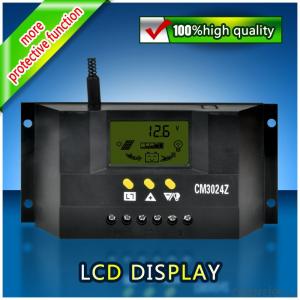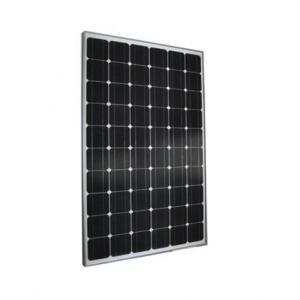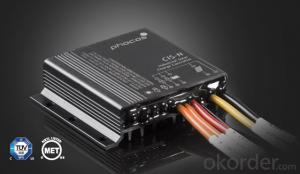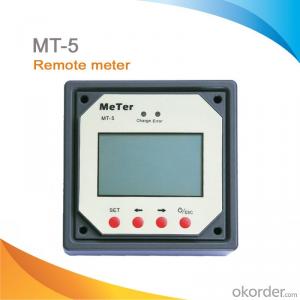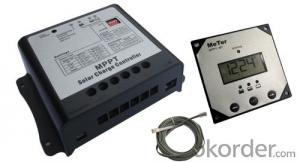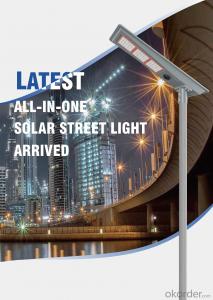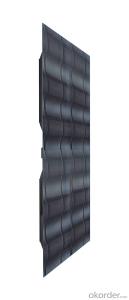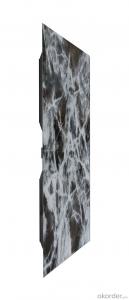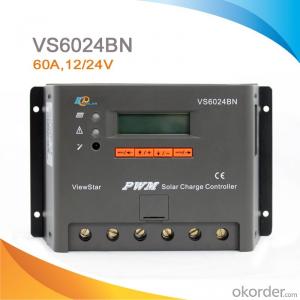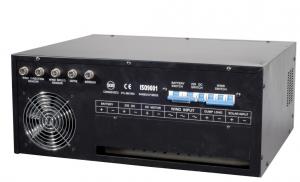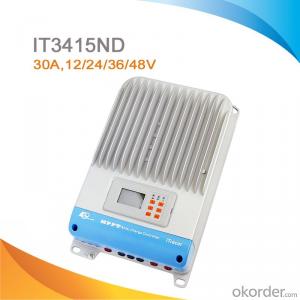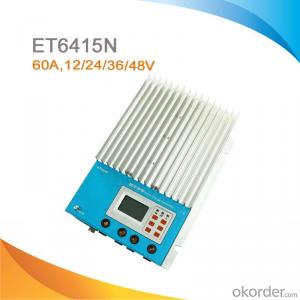Solar LCD Controller CM5048Z with best price
- Loading Port:
- China main port
- Payment Terms:
- TT or LC
- Min Order Qty:
- 1 unit
- Supply Capability:
- 10000 unit/month
OKorder Service Pledge
Quality Product, Order Online Tracking, Timely Delivery
OKorder Financial Service
Credit Rating, Credit Services, Credit Purchasing
You Might Also Like
Solar LCD Controller CM5048Z
Selection of high-quality materials properties be consistent from beginning to end
High Quality, High Performance.
For life is a convenient
A little more secure
The innovation design idea of the perfect show
The first set of people-oriented
The high-end configuration components
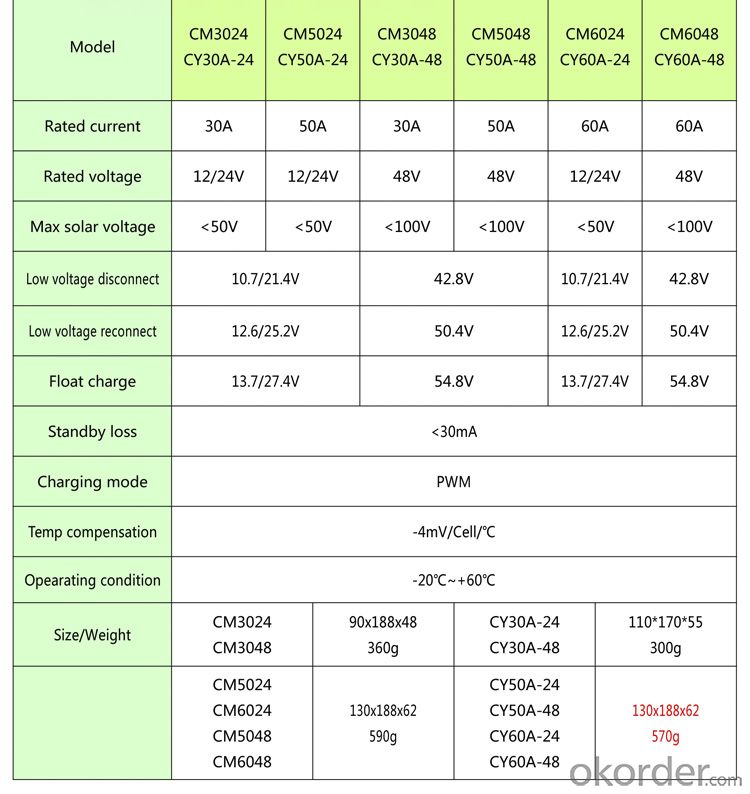
- Q:Can a solar controller be used with solar panel balcony mounts?
- Yes, a solar controller can be used with solar panel balcony mounts. A solar controller is responsible for regulating the amount of power that is supplied to the battery from the solar panels. It helps to prevent overcharging and ensures efficient energy management. Regardless of the mounting location, such as a balcony, a solar controller can still be used to optimize the performance and protection of the solar panel system.
- Q:Can a solar controller be used in extreme weather conditions?
- Yes, a solar controller can be used in extreme weather conditions. Solar controllers are designed to withstand a wide range of weather conditions, including extreme heat, cold, humidity, and even heavy rain or snow. They are built with durable materials and often have protective features to ensure their functionality and reliability in harsh environments.
- Q:Can a solar controller be used with a solar-powered electric vehicle charging station?
- Yes, a solar controller can be used with a solar-powered electric vehicle charging station. The solar controller regulates and optimizes the power output from the solar panels to charge the electric vehicle's batteries efficiently. It ensures that the charging station receives the appropriate voltage and current from the solar panels, thereby maximizing the charging performance and minimizing any potential damage to the batteries.
- Q:Can a solar controller be used with solar panel window mounts?
- Yes, a solar controller can be used with solar panel window mounts. A solar controller regulates the charging and discharging of the batteries connected to the solar panels. It is compatible with different mounting options, including window mounts, as long as the solar panels are properly connected to the controller.
- Q:What is the maximum discharge current that a solar controller can provide?
- The maximum discharge current that a solar controller can provide depends on various factors such as the model and specifications of the controller. The maximum discharge current can range from a few amps to several hundred amps, depending on the capacity and design of the controller.
- Q:How does a solar controller handle high voltage spikes or surges?
- A solar controller is designed to handle high voltage spikes or surges in a few different ways. Firstly, most solar controllers have built-in overvoltage protection, which means they can withstand higher voltages than what they are rated for without getting damaged. This feature helps to protect the controller from voltage spikes that may occur during thunderstorms or other electrical disturbances. Additionally, solar controllers often employ surge protection devices such as varistors or transient voltage suppressors. These devices are designed to divert excess voltage away from the controller, ensuring that it does not get overwhelmed by the sudden surge. Furthermore, some solar controllers also have voltage clamping circuits that limit the voltage to a safe level. These circuits act as a safety net by preventing the voltage from exceeding a certain threshold, even if a spike or surge occurs. Overall, the combination of overvoltage protection, surge protection devices, and voltage clamping circuits allows a solar controller to effectively handle high voltage spikes or surges. By absorbing, diverting, or limiting the excess voltage, the solar controller ensures the safety and longevity of the system it is connected to.
- Q:What is the difference between a PWM and MPPT solar controller?
- A PWM (Pulse Width Modulation) solar controller regulates the voltage output of the solar panels by rapidly turning the panels on and off. It is a basic and cost-effective controller suitable for smaller solar systems. On the other hand, an MPPT (Maximum Power Point Tracking) solar controller is more advanced and efficient. It actively tracks the maximum power output of the solar panels and adjusts the voltage and current accordingly to maximize the energy harvest. MPPT controllers are more expensive but offer higher conversion efficiency, especially in larger solar systems or those with varying weather conditions.
- Q:How does a solar controller handle power fluctuations from the solar panels?
- The solar controller, also referred to as a charge controller, plays a vital role in managing power fluctuations from solar panels in a solar power system. Its main function is to regulate and control the charging process of batteries, preventing overcharging or undercharging. To effectively handle power fluctuations from the solar panels, the solar controller employs various techniques. One of the primary methods is the utilization of maximum power point tracking (MPPT) technology. This technology enables the solar controller to constantly monitor the voltage and current output of the solar panels and adjust the charging parameters accordingly. During power fluctuations, the solar controller continuously tracks the maximum power point of the solar panels, which is the point at which they generate the most power. This ensures that the solar panels operate at their optimal efficiency, irrespective of fluctuations in sunlight intensity, temperature, or shading. By utilizing MPPT, the solar controller extracts the maximum available power from the solar panels and delivers it to the batteries. Additionally, the solar controller incorporates various protection mechanisms to handle power fluctuations. It includes features such as overvoltage protection, low voltage disconnect, and short circuit protection. These safety measures safeguard the solar panels, batteries, and other system components from potential damage caused by voltage spikes, sudden drops in voltage, or electrical faults. Furthermore, advanced solar controllers offer advanced algorithms and programming options. These allow the controller to dynamically adjust the charging parameters based on the solar panel's performance, battery condition, and system requirements. This adaptability ensures efficient power management and optimal battery charging, even in the face of power fluctuations. In summary, a solar controller utilizes MPPT technology, implements protective measures, and employs advanced algorithms to handle power fluctuations from solar panels. Its purpose is to ensure the smooth and efficient operation of the solar power system, maximize power generation, and prolong the lifespan of the batteries.
- Q:Can a solar controller be used with a solar panel cleaning system?
- Yes, a solar controller can be used with a solar panel cleaning system. A solar controller is responsible for regulating the power flow from the solar panels to the batteries or grid, ensuring optimal performance and protection. Using a solar controller in conjunction with a solar panel cleaning system can help monitor and control the power output, ensuring efficient cleaning operations without any potential damage to the panels.
- Q:Can a solar controller be used with a solar-powered electric fence energizer?
- Yes, a solar controller can be used with a solar-powered electric fence energizer. The solar controller helps regulate and optimize the charging of batteries used in the electric fence energizer, ensuring efficient operation and extending battery life.
1. Manufacturer Overview |
|
|---|---|
| Location | |
| Year Established | |
| Annual Output Value | |
| Main Markets | |
| Company Certifications | |
2. Manufacturer Certificates |
|
|---|---|
| a) Certification Name | |
| Range | |
| Reference | |
| Validity Period | |
3. Manufacturer Capability |
|
|---|---|
| a)Trade Capacity | |
| Nearest Port | |
| Export Percentage | |
| No.of Employees in Trade Department | |
| Language Spoken: | |
| b)Factory Information | |
| Factory Size: | |
| No. of Production Lines | |
| Contract Manufacturing | |
| Product Price Range | |
Send your message to us
Solar LCD Controller CM5048Z with best price
- Loading Port:
- China main port
- Payment Terms:
- TT or LC
- Min Order Qty:
- 1 unit
- Supply Capability:
- 10000 unit/month
OKorder Service Pledge
Quality Product, Order Online Tracking, Timely Delivery
OKorder Financial Service
Credit Rating, Credit Services, Credit Purchasing
Similar products
New products
Hot products
Hot Searches
Related keywords
